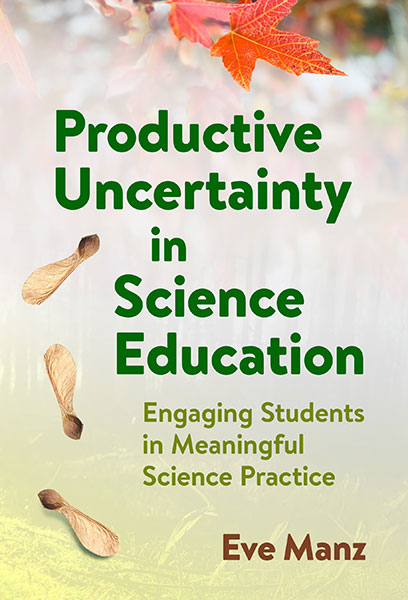Professors: Request an Exam Copy
Print copies available for US orders only. For orders outside the US, see our international distributors.
Publication Date: May 23, 2025
Pages: 224

Productive Uncertainty in Science Education provides the support that teachers and students need for more complex science investigations.
Science is driven by the need to manage uncertainty—uncertainty about how to explain the world, but also how to represent the world in an investigation, what to measure, and how to convince peers to see what the scientist wants them to see. For children, uncertainty supports engagement with materials, more purposeful science practice, and deeper conceptual understanding, yet classroom investigations typically reflect little of the uncertainty that scientists grapple with. How can we move past cookbook science investigations and provide the support that teachers and students need for more complex work?
This book introduces a framework describing specific forms of science activity, shares stories of children engaging with uncertainty, and provides practical supports to help K–12 teachers deepen their science teaching practice. The text includes tools for building classroom norms, planning and adapting investigations, leading discussions, and designing student sheets and other forms of support. The framework, tools, and examples are drawn from research conducted in partnership with elementary teachers and instructional leaders and have been applied in secondary science classrooms as well.
Book Features:
Eve Manz is an associate professor of science education at Boston University Wheelock College of Education and Human Development. She has received the 2019 NARST Early Career Research Award and a National Science Foundation CAREER Award. Collaborators on the book include elementary teachers and coaches and doctoral researchers with expertise in language, classroom culture, and secondary school science teaching.
"This is an essential read for educators who want their students to take an active role in purpose-driven and authentic investigations. Each chapter provides classroom-tested tools for helping young learners explore alternative ways of testing ideas, make sense of ambiguity in outcomes, and explain phenomena that matter to them."
—Mark Windschitl, professor of science education, University of Washington
“The voices of children and teachers enliven Productive Uncertainty in Science Education, and Manz's writing is clear and engaging. Each chapter presents tools, frameworks, principles, and strategies—and lots of examples—to help educators move toward this inspiring vision of science instruction.”
—Elizabeth A. Davis, professor, Marsal Family School of Education, University of Michigan
“With grounded, useful tools and rich stories of practice, this fascinating book explores how identifying and grappling with uncertainty can make science investigations a meaningful process of figuring out in a classroom community. Its accessible tools invite teachers, researchers, and designers to bring these approaches to life in their own classrooms.”
—Brian J. Reiser, Orrington Lunt Professor of Learning Sciences, Northwestern University
Contents
Preface ix
1. The Power of Uncertainty in Classroom Science 1
Uncertainty Is Inherent to Scientists’ and Engineers’ Work 4
Uncertainty Supports Students’ Learning 5
Challenges to Incorporating Uncertainty in Science Learning 9
Our Approach to Incorporating Productive Uncertainty in Science Investigations 11
How the Book Will Help You Understand and Take Up This Approach 14
Summary and Getting Started 15
2. Uncertainty in Science Investigations 17
What Are Science Investigations? 17
The Investigations Framework 20
How Students Experience and Express Uncertainty 31
The Meeting Points of the Investigations Framework and Students’ Uncertainty 33
Summary 36
3. Conditions That Foster Productive Uncertainty 42
Moving Beyond an All-or-Nothing Approach: Principles for Working With Uncertainty in Investigations 42
Teacher Practice in a Moment of Uncertainty 50
Teacher Dispositions 51
Putting It Together: Returning to the Maple Seed 56
Summary 60
4. Developing a Caring and Collective Classroom Culture 61
With Annabel Stoler
Uncertainty in Action 62
Classroom Culture 65
Classroom Norms That Support a Caring and Collective Classroom Culture 69
Introducing, Using, and Refining Norms to Support a Caring and Collective Classroom Culture 73
Summary 79
5. Helping Children Plan and Conduct Science Investigations 81
With Annabel Stoler
Uncertainty in Action 82
Opportunities and Challenges in Planning and Conducting Investigations 84
Supporting Students Planning Science Investigations 87
Classroom Examples of Planning Investigations 94
Supporting Students Conducting Investigations 100
Summary 104
6. Working With Observations and Data 106
Uncertainty in Action 107
Opportunities and Challenges in Working With Observations and Data 110
Supporting Students Working With Observations, Measurements, and Data 113
Classroom Examples of Supporting Observations and Data 120
Making Claims in Light of Variability in Data 128
Summary 129
7. Making Sense of Evidence From Investigations 130
Uncertainty in Action 131
Opportunities and Challenges in Making Sense of Investigations 133
Supporting Students Making Sense of Evidence From an Investigation 136
A Classroom Example 147
Summary 156
8. Explanations and Resources for Explanation 158
Uncertainty in Action 158
Opportunities and Challenges in Developing Explanations 162
Supporting Students Developing Explanations of Phenomena 166
A Classroom Example: Explanation in the Conservation of Matter Investigation 177
Summary 184
9. Putting the Pieces Together 186
Learn to See and Value Uncertainty 186
Adapt an Investigation for Uncertainty 188
Learn With and From Students 194
Acknowledgments 197
References 199
Index 203
About the Author 209
Professors: Request an Exam Copy
Print copies available for US orders only. For orders outside the US, see our international distributors.